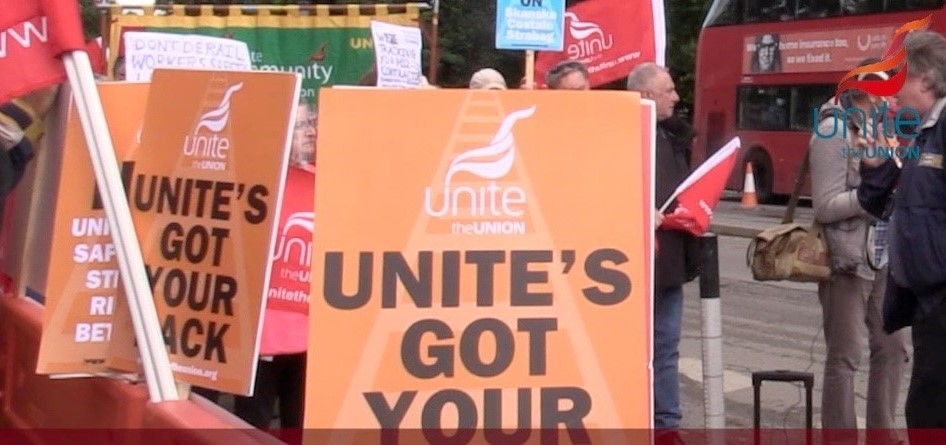Carillion pensions scandal
Carillion’s pensions blackhole is at least £990m, the firm’s former chair of trustees has revealed – nearly twice previously thought.
Following the revelation, Unite called for all possible legal avenues to be explored to recoup money and for the introduction of stronger laws to prevent future scandals.
A letter from the firm’s pension trustee chairman Robin Ellison to MPs suggests Carillion’s pension deficit is much bigger than the £590m previously estimated.
Ellison’s letter suggests the pensions black hole could in fact be nearly £1bn – with some estimates even placing the figure at £2.6bn.
As a result of the company’s collapse, Carillion’s pension schemes will be transferred to the Pension Protection Fund.
This will result in existing pensioners having lower increases in future, while other members of its schemes will see the value of their pension fall by about 15 per cent.
‘Greed’
Unite assistant general secretary Gail Cartmail said, “The scale of the deficit is astronomical; it is disgraceful that the company continued to pay shareholders dividends and to pay bonuses to its senior staff, while the pension black hole was allowed to spiral out of control.
“Members of Carillion’s pension schemes will pay for the greed of the directors and the shareholders for the rest of their lives, with vastly reduced retirement incomes.”
That greed is manifested in the actions of former chief executive Richard Howson who received ÂŁ6m in pay and perks in the five years before resigning in July 2017, when Carillion was first forced to issue a profit warning. Howson also received a whopping 40 per cent of his salary as pension contributions.
However, despite his resignation Howson continued to be paid a basic wage of ÂŁ55,000 a month.
It has also emerged that in 2016 Carillion changed its pay policy making it far more difficult for director’s bonuses to be repaid if the company then ran into financial problems.
“Every legal avenue needs to be explored to discover if money can be reclaimed from directors and shareholders and if those responsible can be prosecuted. It is outrageous that those responsible, who were lining their pockets while Carillion collapsed, could escape scot-free,” Cartmail said.
Pension raid
The Pensions Regulator is also being scrutinised, after it was revealed that it sanctioned a raid last autumn on the firm’s pension fund by Carillion executives, who were attempting to shore up its failing finances.
With the regulator’s approval, Carillion pension trustees “negotiated away” payments to reduce the massive deficit to allow the firm to keep borrowing.
The company had already claimed poor finances had prevented it making higher pensions contributions in 2011 and 2013, although money was found to pay shareholders ÂŁ70m in dividends for both years.
Cartmail said, “The Carillion crisis demonstrates once again that existing pension laws are far too weak. The actions of the pension regulator need to be urgently reviewed and if necessary its powers strengthened.
“Yet again the government has been caught sleeping on the job and its processes have been found not fit for purpose. New laws must be introduced which mean that bosses who benefit at the expense of pension members are suitably punished.”
TUPE
Meanwhile, on Friday it was revealed that former Carillion contractors will not be covered under Transfer of Undertakings (Protection of Employment) (TUPE) regulations, meaning their previous pay and conditions are not guaranteed and maybe downgraded.
Union representatives were informed of the developments in a letter from auditors PWC, who have been involved in Carillion’s liquidation.
Following Carillion’s collapse two weeks ago, the government announced that staff working on the firm’s 450 public sector contracts will retain their jobs.
The Insolvency Service then said workers on 90 per cent of Carillion’s private sector contracts for cleaning and maintenance will continue to be paid until long term arrangements are found.
However, the PWC letter confirms that TUPE will not apply for workers that move company.
It states, “In this situation staff will not automatically transfer under TUPE because a winding up order has been made against each of the Carillion companies.”
PWC said possible transfers of staff may need to take place in a “matter of days – perhaps less” and that some could take place before January 31.
“This is a further slap in the face for Carillion workers and demonstrates the hollowness of the government’s initial promises,” said Cartmail.
“Even if the jobs of workers are preserved they now face the prospect of being transferred to new companies without warning with potentially far lower rates of pay and poorer conditions.
“The government and its task force needs to immediately get a grip of this issue and to ensure that companies taking on Carillion workers respect their existing pay, conditions, pensions and length of service.”
Cartmail said the union will use all available legal avenues to prevent employers attempting to enrich themselves “by picking up contracts and slashing workers’ pay”.
 Like
Like Follow
Follow


